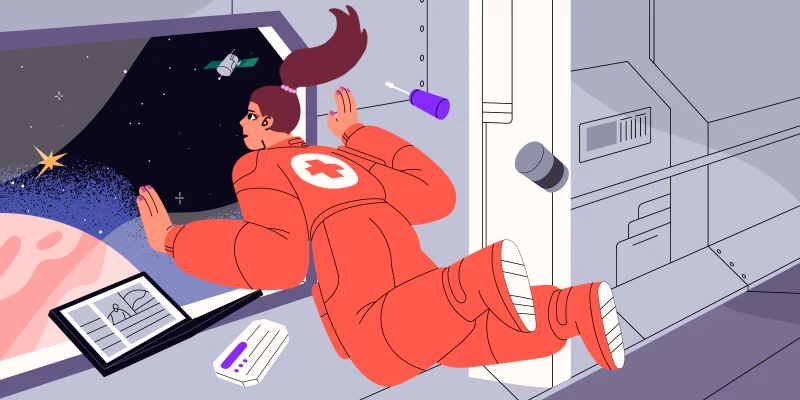I followed my attending, Dr. Roshni Patel, as she rushed back to the exam room of my 6-week-old patient. "That baby is really sick," she explained in a teaching moment I will never forget. I presented the case to her moments earlier, but I missed key signs that the baby required immediate medical attention. In the exam room, she pointed out the flaws in my assessment: the high respiratory and heart rate, the fussiness. A lumbar puncture was needed. In that moment, I felt inadequate. Yet, instead of shaming me, my attending guided me in better medical decision-making. Looking back, I realize that she embodied an effective, compassionate way of teaching that evoked the serene, temperate guidance of a guru.
In the classical language of Sanskrit, guru means "venerable" and refers to a person with wisdom offering knowledge to anyone seeking shelter. In the "Bhagavad Gita," an ancient work of literature, the famous warrior Arjuna is overcome with emotion at the thought of fighting his family and friends on the battlefield, and refuses to fight. Bewildered by what he feels is a thankless task, he seeks advice from his charioteer, Krishna, whom he accepts as his guru. Krishna reminds Arjuna that it is his duty to fight, however uncomfortable it may be.
While the practice of medicine does not take place on a battlefield, physicians are often fighting for their patients, whether advocating for medication coverage, making the correct diagnosis, or implementing quality-improving measures. But some physicians may opt for an easier path, just as Arjuna wished to retreat from the battlefield. A survey by the American Medical Association revealed 40% of surveyed physicians reported thinking about leaving medicine, with more than half reporting high levels of job stress. Another survey showed that "supportive leadership measures" were associated with a lower intention to leave medicine, evidence that physicians need better mentorship. In fact, a study of the impact of a mentoring program within the Department of Pediatrics at Stanford University School of Medicine led to a dramatic improvement in physician retention compared to the years prior to program implementation. Physician-leaders and hospital administrators need to recognize that institutions would benefit from supporting physicians with time to meet with mentors.
Although the Stanford study focused on mentorship for early-career physicians, physicians can benefit from mentorship regardless of career stage. In his essay entitled "Personal Best," Dr. Atul Gawande writes about the importance of keeping up with his surgical skills by utilizing a coach well after training is complete. I have had impressionable experiences with peer mentorship. A colleague asked me to assume a leadership role, even though I felt that I had very little experience. A senior colleague in another division encouraged me to finish and publish my data on severe vaping-related lung injury before anyone else did, which led to publication in a popular scientific journal. More recently, another senior colleague identified me as a passionate person with a non-mainstream perspective, after which she invited me to become a member of an executive committee in an international medical society. These positive experiences remind me of when the stakes were high (an impending war), and despite having had extensive training, Arjuna still sought Krishna's advice. We need more gurus in medicine who don’t hesitate to challenge or sponsor us.
The development of mentorship skills, however, is crucial to the success of the mentor-mentee relationship. Prior to giving advice to Arjuna, Krishna listened, and when Arjuna asked clarifying questions, Krishna again listened before answering. In a review article, Henry-Noel et al. characterize ideal mentors as generous, selfless, patient, understanding, and as "active listeners" — all words I would use to describe my mentors. When I had difficultly finishing a scientific manuscript, my research mentor asked a post-doc in her lab to assist me. When I dropped a central line guidewire in the PICU, my supervising fellow calmly retrieved another (very expensive) kit rather than admonishing me. I was able to submit a better designed research study to the IRB in much less time because another mentor assigned a research coordinator to help me. Experiencing these acts of kindness inspires me to pass along the same level of compassion to my mentees.
At the end of the "Bhagavad Gita," Arjuna feels empowered to pick up his bow and arrow and fight in a war to restore goodness within the kingdom. He tells Krishna that his "illusion is gone … I am firm and free from doubt." He prevails as a renewed warrior in a classic story I view as the preeminent mentoring session with his guru. This ancient story allows us to appreciate essential mentoring characteristics that have long been underappreciated: listening before advising, assessing the strengths and potential of the mentee, and being present on the battlefield when the mentee is most in need. Providing physicians with the time and resources to develop and impart these skills should be an immediate priority by health care institutions, which will result in current and future generations of physicians feeling supported and delivering better care.
Dr. Rao gives special thanks to her mentors: Dr. Roshni Patel, Dr. Wanda Phipatanakul, Dr. Susan Morris, Dr. Sarah Messiah, as well as Rtadvaja Swami, her spiritual mentor, for inspiring this piece.
Devika Rao is a practicing pediatric pulmonologist in Texas. She enjoys writing, trying new vegetarian recipes, yoga, and spending time with her two boys and husband. Dr. Rao is a 2024-2024 Doximity Op-Med Fellow.
Image by Good Studio / Shutterstock





